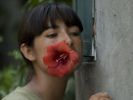Eye For Film >> Movies >> The Milk Of Sorrow (2008) Film Review
Claudia Llosa's second feature opens with a dying old lady singing a sweet-sounding melody. Its uplifting lilt is in sharp contrast with the lyrics, which speak of her rape and of being forced to eat her dead husband's penis. This is Peru, where such atrocities burn strong in the memory, thanks to the Shining Path, a rebel movement whose brutality in pursuit of their own brand of 'revolution' was extreme and at its height in the Eighties, when some 70,000 people died as a result of their actions or as part of the counter-insurgency. Many of the women did not die, but were raped and abused, as both sides saw them as fair game in their 'tactical warfare'.
Llosa's film examines the echoes of this terrible time from a safe distance through allegory that, like that opening song, is at once sweet but with a forceful message. The milk of sorrow of the film's title refers to an echo of the past, too, stemming from a superstition that women who were raped during pregnancy would, through the breast milk of their mothers, inherit their sadness and carry it with them.

Fausta - a name derived, ironically, from the Latin word for Lucky - is one such victim, her mother's rape leaving her emotionally scarred and scared of everything. Her fear of suffering the same fate is, in fact, so acute that she has taken the extreme contraceptive measure of putting a potato inside her as a deterrent - a potato that we learn is threatening to kill her and yet she cannot bring herself to have it removed by doctors, though she tries to 'tend' to it to limit its growth. This is just one of the allegorical devices that pepper the film, but Llosa has such a naturalistic approach that they never feel as heavy-handed as they look on paper.
The death of her mother forces her to seek employment in order to raise the cash to bury her body in her own village rather than out in the Lima slums. Again, there is no doubting that the mother's dead body comes to symbolise the past that Fausta must come to terms with and leave behind. Similarly, the house where she goes to work - shrouded from the bustling town by an impenetrable gate - is run by the upper-class Aída, who also comes to symbolise the sort of exploitation the poor can expect from the bourgeousie. And yet, in a curious way, it is through her experiences at the house that Fausta is able to both physically and metaphorically find her voice, encouraged as she is to sing for Aída in return for pearls that could pay for her mother's internment. It is here, too, that she meets a gardener - a very different type of male than the more predatory sort she is used to in the slums - who in an extension of the film's central allegory, plants everything except for potatoes.
Magaly Solier, who since being 'discovered' by Llosa for her debut Madeinusa is becoming something of a hot property in Peru, is perfect for the role, bringing the right combination of timidity and hope, so that the blossoming of Fausta feels as gradual and natural as one of the gardener's plants.
Llosa's film is beautiful to look at, every scene exquisitely constructed, nothing there without good reason. As with Madeinusa she also makes some terrific use of the contrast between the superstitions and traditions of 'old Peru' - much of the action is set against the backdrop of a series of weddings in the slums where Fausta lives - and the more modernised, though not necessarily superior, attitudes prevalent in the more affluent parts of the cities. Although the layers of symbolism and allegory certainly add to the depth of the film's resonance, those who consider it purely as a more simply magic realist-inflected coming of age tale are unlikely to be disappointed either. Heavy on themes yet light with her touch, Llosa has crafted another delicate but complex gem.
Reviewed on: 29 Mar 2010


















